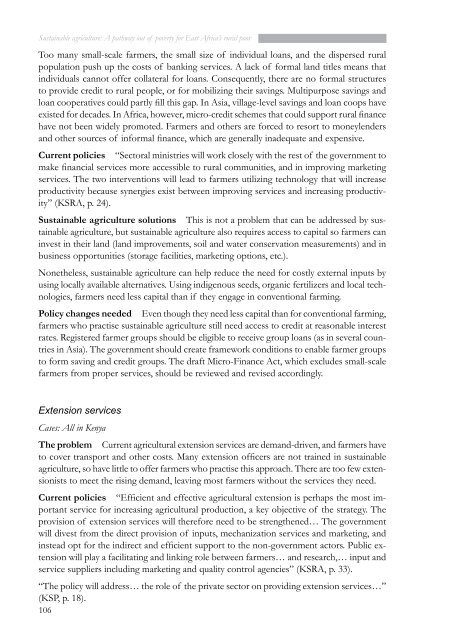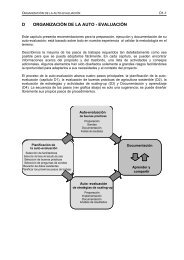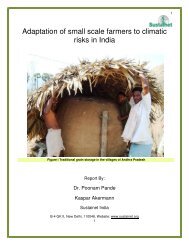cases from tanzania - Sustainet
cases from tanzania - Sustainet
cases from tanzania - Sustainet
You also want an ePaper? Increase the reach of your titles
YUMPU automatically turns print PDFs into web optimized ePapers that Google loves.
Sustainable agriculture: A pathway out of poverty for East Africa’s rural poor<br />
Too many small-scale farmers, the small size of individual loans, and the dispersed rural<br />
population push up the costs of banking services. A lack of formal land titles means that<br />
individuals cannot offer collateral for loans. Consequently, there are no formal structures<br />
to provide credit to rural people, or for mobilizing their savings. Multipurpose savings and<br />
loan cooperatives could partly fill this gap. In Asia, village-level savings and loan coops have<br />
existed for decades. In Africa, however, micro-credit schemes that could support rural finance<br />
have not been widely promoted. Farmers and others are forced to resort to moneylenders<br />
and other sources of informal finance, which are generally inadequate and expensive.<br />
Current policies “Sectoral ministries will work closely with the rest of the government to<br />
make financial services more accessible to rural communities, and in improving marketing<br />
services. The two interventions will lead to farmers utilizing technology that will increase<br />
productivity because synergies exist between improving services and increasing productivity”<br />
(KSRA, p. 24).<br />
Sustainable agriculture solutions This is not a problem that can be addressed by sustainable<br />
agriculture, but sustainable agriculture also requires access to capital so farmers can<br />
invest in their land (land improvements, soil and water conservation measurements) and in<br />
business opportunities (storage facilities, marketing options, etc.).<br />
Nonetheless, sustainable agriculture can help reduce the need for costly external inputs by<br />
using locally available alternatives. Using indigenous seeds, organic fertilizers and local technologies,<br />
farmers need less capital than if they engage in conventional farming.<br />
Policy changes needed Even though they need less capital than for conventional farming,<br />
farmers who practise sustainable agriculture still need access to credit at reasonable interest<br />
rates. Registered farmer groups should be eligible to receive group loans (as in several countries<br />
in Asia). The government should create framework conditions to enable farmer groups<br />
to form saving and credit groups. The draft Micro-Finance Act, which excludes small-scale<br />
farmers <strong>from</strong> proper services, should be reviewed and revised accordingly.<br />
Extension services<br />
Cases: All in Kenya<br />
The problem Current agricultural extension services are demand-driven, and farmers have<br />
to cover transport and other costs. Many extension officers are not trained in sustainable<br />
agriculture, so have little to offer farmers who practise this approach. There are too few extensionists<br />
to meet the rising demand, leaving most farmers without the services they need.<br />
Current policies “Efficient and effective agricultural extension is perhaps the most important<br />
service for increasing agricultural production, a key objective of the strategy. The<br />
provision of extension services will therefore need to be strengthened… The government<br />
will divest <strong>from</strong> the direct provision of inputs, mechanization services and marketing, and<br />
instead opt for the indirect and efficient support to the non-government actors. Public extension<br />
will play a facilitating and linking role between farmers… and research,… input and<br />
service suppliers including marketing and quality control agencies” (KSRA, p. 33).<br />
“The policy will address… the role of the private sector on providing extension services…”<br />
(KSP, p. 18).<br />
106




